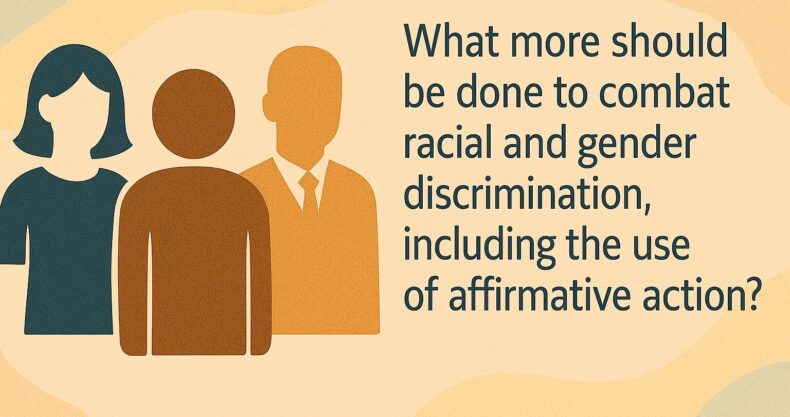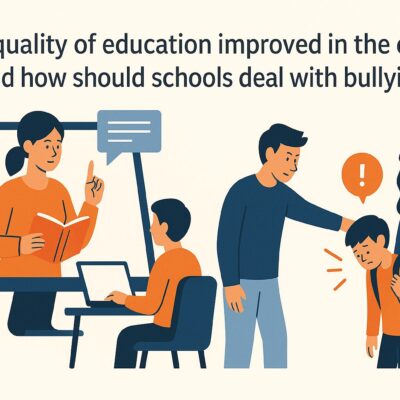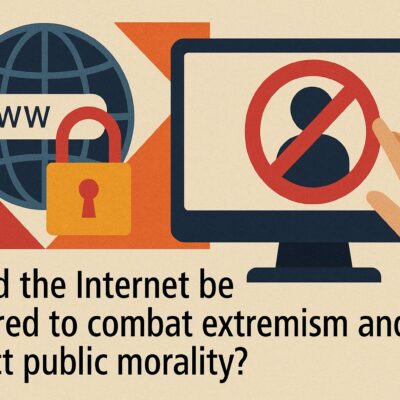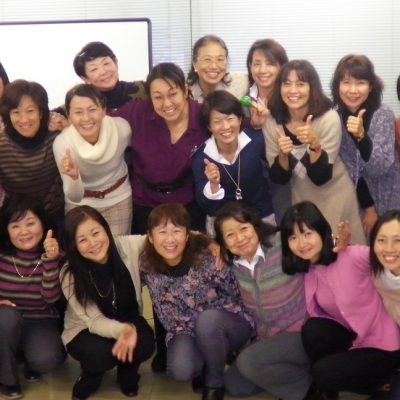トピック: What more should be done to combat racial and gender discrimination, including the use of affirmative action?
- 英語のみバージョン (English Only Version)
1.1. 教育と意識改革の強化 (Focus: Education and Awareness)
Introduction & Opinion
The topic is how to combat racial and gender discrimination. I believe that strengthening education and raising public awareness are the most important long-term solutions. Changing people’s hearts and minds is the key to true equality.
Reason 1: Eliminating Prejudice
First, education can help to eliminate prejudice from a young age. Schools should teach children about different cultures, histories, and perspectives. When children learn to respect diversity, they are less likely to develop discriminatory views. This creates a foundation for a more inclusive society in the future.
Reason 2: The Role of Media
Second, the media must play a bigger role in raising awareness. TV shows, movies, and news reports should show diverse people in positive and non-stereotypical ways. This helps to change the unconscious biases that many adults hold. Public campaigns can also highlight the negative effects of discrimination and encourage people to speak out against it.
Conclusion
In conclusion, while laws are necessary, the most effective way to combat discrimination is through education and media awareness. This focuses on the root cause of the problem: people’s attitudes.
1.2. 法律と企業文化の改革 (Focus: Law and Corporate Culture)
Introduction & Opinion
The topic is how to combat racial and gender discrimination. I believe that stronger laws and fundamental changes in corporate culture are the most effective immediate actions. We need clear rules and enforcement to ensure fairness now.
Reason 1: Strict Enforcement of Laws
First, governments must ensure the strict enforcement of anti-discrimination laws. Companies and individuals who discriminate must face severe penalties. This sends a clear message that discrimination is unacceptable. Also, affirmative action can be used temporarily to correct historical imbalances and ensure that qualified people from minority groups get fair opportunities.
Reason 2: Transforming Corporate Culture
Second, companies must transform their internal culture. They should set clear goals for diversity in hiring and promotion. Training programs should be mandatory for all employees to recognize and stop unconscious bias. When a company’s leadership truly values diversity, it creates a workplace where everyone feels respected and can succeed.
Conclusion
In conclusion, the most effective way to combat discrimination is through strict legal enforcement and transforming corporate culture. These actions provide immediate and measurable results in creating a more equal society.
- 注釈付きバージョン (Annotated Version)
2.1. 教育と意識改革の強化 (Focus: Education and Awareness)
導入と意見 (Introduction & Opinion)
The topic is how to combat (戦う) racial discrimination (人種差別) and gender discrimination (性差別). I believe that strengthening (強化すること) education and raising public awareness (一般の意識を高めること) are the most important long-term solutions (長期的な解決策). Changing people’s hearts and minds is the key to true equality.
理由1: 偏見の解消 (Eliminating Prejudice)
First, education can help to eliminate prejudice (偏見をなくす) from a young age. Schools should teach children about different cultures, histories, and perspectives (視点). When children learn to respect diversity (多様性), they are less likely to develop discriminatory views (差別的な見方). This creates a foundation for a more inclusive society (包摂的な社会) in the future.
理由2: メディアの役割 (The Role of Media)
Second, the media must play a bigger role in raising awareness. TV shows, movies, and news reports should show diverse people in positive and non-stereotypical ways. This helps to change the unconscious biases (無意識の偏見) that many adults hold. Public campaigns can also highlight the negative effects of discrimination and encourage people to speak out against it.
結論 (Conclusion)
In conclusion, while laws are necessary, the most effective way to combat discrimination is through education and media awareness. This focuses on the root cause of the problem: people’s attitudes.
2.2. 法律と企業文化の改革 (Focus: Law and Corporate Culture)
導入と意見 (Introduction & Opinion)
The topic is how to combat racial and gender discrimination. I believe that stronger laws and fundamental changes in corporate culture are the most effective immediate actions. We need clear rules and enforcement to ensure fairness now.
理由1: 厳格な法律の施行 (Strict Enforcement of Laws)
First, governments must ensure the strict enforcement of anti-discrimination laws. Companies and individuals who discriminate must face severe penalties. This sends a clear message that discrimination is unacceptable (受け入れられない). Also, affirmative action (積極的差別是正措置) can be used temporarily to correct historical imbalances (歴史的な不均衡) and ensure that qualified people (資格のある人々) from minority groups (少数派グループ) get fair opportunities.
理由2: 企業文化の変革 (Transforming Corporate Culture)
Second, companies must transform (変革する) their internal culture (内部文化). They should set clear goals for diversity in hiring and promotion. Training programs should be mandatory (義務的な) for all employees to recognize and stop unconscious bias. When a company’s leadership truly values diversity, it creates a workplace where everyone feels respected and can succeed.
結論 (Conclusion)
In conclusion, the most effective way to combat discrimination is through strict legal enforcement and transforming corporate culture. These actions provide immediate and measurable results (測定可能な結果) in creating a more equal society.
注釈リスト (Annotations List)
英語 (English) | 日本語訳 (Japanese Translation) |
combat | 戦う |
racial discrimination | 人種差別 |
gender discrimination | 性差別 |
affirmative action | 積極的差別是正措置 |
strengthening | 強化すること |
raising public awareness | 一般の意識を高めること |
long-term solutions | 長期的な解決策 |
eliminate prejudice | 偏見をなくす |
perspectives | 視点 |
diversity | 多様性 |
discriminatory views | 差別的な見方 |
inclusive society | 包摂的な社会 |
unconscious biases | 無意識の偏見 |
unacceptable | 受け入れられない |
historical imbalances | 歴史的な不均衡 |
qualified people | 資格のある人々 |
minority groups | 少数派グループ |
transform | 変革する |
internal culture | 内部文化 |
mandatory | 義務的な |
measurable results | 測定可能な結果 |



















